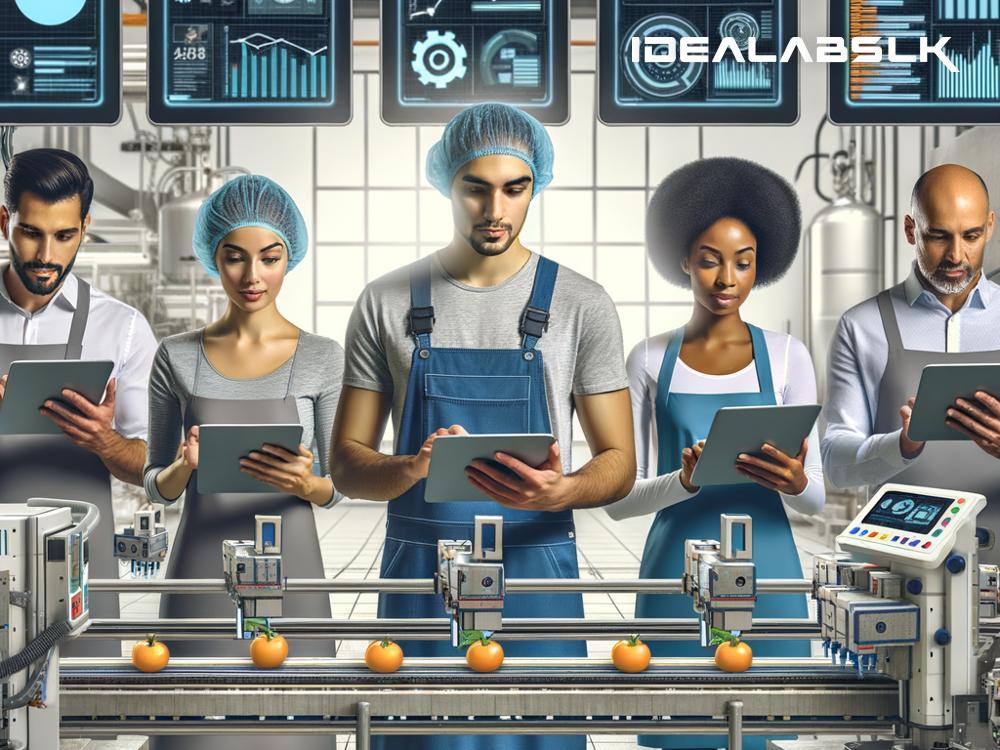If you've ever watched episodes of How It's Made, you'd know that making food isn't just about mixing ingredients. It's a precise science where temperatures, timings, and textures must be just right. In large-scale food manufacturing, ensuring consistency and quality in every product isn't just ideal; it's essential. That's where artificial intelligence (AI) steps in, particularly in offering real-time feedback on manufacturing lines. Let's delve into how AI is revolutionizing the way our food is made, ensuring that delicious, high-quality products are the norm, not the exception.
The Recipe for AI in Food Manufacturing
Imagine having an expert chef with the ability to taste a dish and immediately know what's missing or how it could be improved. Now, imagine this chef can analyze thousands of dishes per minute and give feedback instantly. This is, in essence, what AI brings to food manufacturing.
AI systems in food production are not about replacing human workers but about enhancing their abilities and ensuring safety, consistency, and efficiency. These systems can monitor various stages of production in real time, from the initial mixing of ingredients to the final packaging. Using sensors and data analytics, they can provide instant feedback if something is off. For example, if a batch of dough isn't the right consistency, AI can alert operators to adjust the mix before it moves to the next stage.
Flavorful Benefits: Quality and Consistency
One of the prime advantages of using AI for real-time feedback is the unmatched consistency it offers. Maintaining uniformity in food products is challenging, especially when dealing with natural ingredients that can vary in taste and texture. AI overcomes this by continuously analyzing and adjusting the manufacturing process, ensuring that every cookie, chip, or chocolate bar tastes just the same as the last.
Moreover, AI can help maintain high-quality standards by detecting deviations that human eyes might miss. It can spot tiny but critical issues, such as foreign objects in food or slight color variations, signaling potential quality concerns. This real-time feedback enables immediate action, reducing waste and ensuring only safe, high-quality products reach the consumers.
Recipe for Efficiency: Reducing Waste and Cost
In the food industry, waste reduction is a hot topic. Not only does it have significant cost implications, but it's also a matter of environmental responsibility. AI can play a crucial role here by optimizing production processes to use resources more efficiently, reducing waste, and saving energy. For example, by accurately predicting the right amount of ingredients needed and optimizing cooking times and temperatures, manufacturers can make significant savings.
Moreover, by catching problems early in the production process, AI prevents the wastage of not just the problematic item but also the time and resources that would have been spent on its further processing. This efficiency translates to lower costs, higher profits, and a greener planet.
A Taste of the Future: Personalization and Innovation
Looking ahead, AI's role in food manufacturing promises not just efficiency and consistency but also innovation. Real-time feedback systems can help manufacturers experiment with new recipes and processes on the fly, safely testing adjustments and instantly understanding their impact.
Moreover, AI opens up exciting possibilities for personalization. Imagine a future where food production lines can quickly adjust to make products that cater to specific dietary needs or taste preferences, all without sacrificing efficiency. This could transform how we think about mass-produced foods, offering a degree of customization that was previously only possible in small-scale artisanal production.
The Human Ingredient
While AI offers incredible benefits, it's essential to remember the human element in food production. AI does not replace the need for skilled workers but rather works alongside them, enhancing their capabilities and allowing them to focus on more complex or creative tasks. The future of food manufacturing, powered by AI, is one where technology and human ingenuity blend to produce food that's delicious, safe, and sustainable.
Stirring It All Together
AI's role in providing real-time feedback in food manufacturing lines is a game-changer. It ensures every bite we take is not only delicious but also the result of a process that's efficient, consistent, and innovative. As technology continues to evolve, we can expect even tastier, safer, and more personalized food products, all thanks to the magic of artificial intelligence. Here's to a future where technology and food come together in the most delightful ways!

